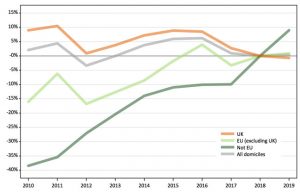New measures will allow international students to seek employment for up to a year
International students will be given visa extensions of up to a year to look for work in the UK as part of a package of government measures to boost numbers of overseas students after Brexit.
The move represents a break with current policy, where students are allowed to stay for just four months after graduation.
Announcing the strategy, the Department for Education (DfE) said: “There is no limit on the number of international students that can study in the UK, and to ensure the UK continues to attract and welcome them, the post-study leave period will be extended to six months for undergraduate and master’s students, and a year for doctoral students.”
The announcement said the government would also consider “how the visa process could be improved for applicants and supporting student employment”, hinting at another possible change in policy.
Alongside the extended visas, the DfE and the Department for International Trade are to unveil an international education strategy with a 30% increase in overseas students in UK higher education during the next decade.
This would raise the number of non-UK students at British universities from 460,000 – including nearly 140,000 from the EU – to 600,000 by 2030, an ambitious target is given that EU students will face higher tuition fees and lose access to student loans after Brexit.
“As we prepare to leave the EU it is more important than ever to reach out to our global partners and maximise the potential of our best assets. That includes our education offer and the international students this attracts,” Damian Hinds, the education secretary, said.
Janet Beer, vice-chancellor of Liverpool University and chair of UniversitiesUK, said her organisation had been in discussion with the government about the strategy for the past six months.
She said: “International students contribute a huge amount to the UK, not only economically but also by enriching the international education environment in our universities for all students. While their presence in the UK is worth an estimated £26bn in direct and knock-on effects, sustaining over 200,000 jobs in all parts of the UK, they bring much wider benefit to our academic and civic communities.
“We particularly welcome steps to improve the visa regime, including the extension of opportunities for our graduates to work in the UK once they graduate, to six months for undergraduates and master’s students, and a year for those who undertake PhDs.
“We would like the government to go further and extend this opportunity to at least two years and we will continue to urge them on this point.”
The visa extension follows a recommendation by the independent migration advisory committee last year, and the government’s own white paper on skills-based immigration published in December. Currently, all graduates can stay for up to four months after finishing their courses, although those with PhDs can apply for an additional year.
Source: https://www.theguardian.com/education/2019/mar/16/visa-extension-overseas-students-uk-brexit?CMP=Share_AndroidApp_Facebook
Non-EU applications to UK universities up this year
The UK application registry UCAS has released new data from its 15 January admissions deadline for the 2019/20 academic year, and so we now have an early view of what enrolment trends may look like for the coming year. “On time” applications received by January 15 are viewed as an important indicator of current demand for British higher education, though students continue to apply after the deadline as well.
Applications to British universities for 2019/20 are up overall, and this marks the first overall increase in three years. More than 561,400 applications were received by UCAS, nearly 2,500 more than at the same time last year.
While the overall growth for this year is marginal, it is being led by a 9% increase in applications from students from outside the European Union. This was driven in large part by a surge from China (+33% over 2018). Looking at the broader pool of applications, there was a 1% decrease in the number of applications from students in the UK, and applications from countries in the EU were up slightly by 1%.

Application volumes to UK universities by student domicile, 2010–2019. Source: UCAS
The healthy growth in non-EU applications and slight growth in EU applications was met with relief by university stakeholders in the UK. “In this time of uncertainty, it’s welcome news to see more EU and international students wanting to come and study in the UK,” said Claire Marchant, UCAS’s chief executive.
Still, the fact that Chinese applications account for so much of the increase is worrying to some who make the point that there needs to be more diversity within the international student population in the UK. Trend data illustrates the extent to which the population of Chinese in UK higher education has grown over the past decade. In 2010, there 4,450 Chinese applications registered, while for the 2019/20 year there were 15,880 plus another 5,100 from Hong Kong.
Looking at the new UCAS data, Nick Hillman, Director of the Higher Education Policy Institute, commented that,
“It is a shame that we are so dependent on one country for our international students … as I would like to see similar growth from other territories too. But I welcome the growth and I also think it will provide the UK with some real soft power benefits in the future, when these people graduate and go back to China with experience here on their CV.”
Needless to say, the same concern could be raised by many leading study destinations, including the US, Australia, and Canada. But in one interesting indication of the significance of China in British higher education enrolments, UCAS observes that there were more applications from China and Hong Kong this year (20,980 combined) than there were from Wales (18,850) or Northern Ireland (17,910).
Comparing to 2018/19 data
At last year’s 15 January deadline, there were 11% more applications from non-EU students than the previous year, marking the first time in five years that applications had gone up from non-EU students. Non-EU applications numbered 58,450 in 2018/19, while this year, there were 63,690 from students from outside the EU, which amounts to 9% year-over-year growth.
Where applications from EU students had dipped in 2017/18, they rose to 43,501 (3.4%) in 2018/19. The latest UCAS data reveals that the growth trend is holding, though modestly so: EU applications grew 1% to 43,890.
UCAS registered 453,840 applications from the UK this year, which represents a decrease of just under 1% compared to the applications received in January 2018.
Country-level trends
While China is the big story in terms of the overall increase in applications volume this year, there were also notable gains from the following important sending markets:
- Canada: +3%
- France: +5%
- India: +5%
- Italy: +2%
- Malaysia: +4%
- Nigeria: +10%
- Spain: +7%
- US: +5%
There were also significant increases from countries sending smaller numbers of students to UK universities. While these are more modest numbers, the extent of the growth is notable given the push for greater diversification of the international student population in the UK.
Source: http://monitor.icef.com/2019/02/non-eu-applications-to-uk-universities-up-this-year/



